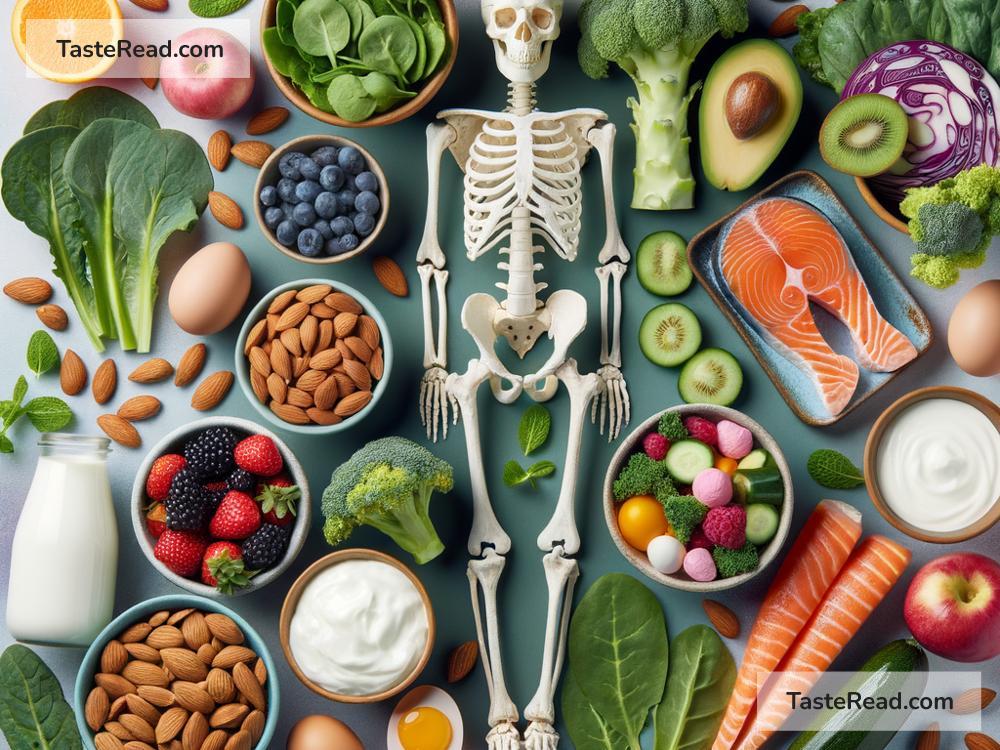The Connection Between Diet and Bone Health: Simple Tips to Keep Your Bones Healthy
Good bone health is important for people of all ages. Our bones support our bodies, protect our organs, and play a big role in movements like walking, running, and picking things up. When we’re young, our bones grow strong, but as we age, they can weaken if we don’t take care of them. One of the best ways to support healthy bones at any age is through diet.
Eating the right foods can strengthen your bones and reduce the risk of conditions like osteoporosis, where bones become thin, brittle, and more likely to break. Let’s take a deeper look into how food affects your bones and what you can do to keep them strong and healthy.
Why Your Bones Need Nutrients
Bones might seem like hard, unchanging parts of your body, but they are very much alive. Bone tissue constantly breaks down and gets rebuilt, a process called “remodeling.” To keep this process running efficiently, your bones require certain nutrients, especially during childhood, when they grow quickly, and older adulthood, when they naturally become weaker.
Key nutrients like calcium, vitamin D, protein, magnesium, and phosphorus play important roles in bone health. Without enough of these nutrients, your bones can grow weak over time.
Calcium: The Building Block of Bones
Calcium is a mineral that your bones depend on. About 99% of the calcium in your body is stored in your bones and teeth. It gives your bones their strength and density.
If you don’t get enough calcium from your diet, your body takes calcium from your bones to keep other processes in your body working, like muscle contractions. Over time, this can lead to weaker bones.
What foods are high in calcium? Here are some great options:
- Dairy products like milk, cheese, and yogurt.
- Leafy greens like spinach, kale, and collard greens.
- Fortified foods like cereal, orange juice, and almond milk.
- Tofu and other soy-based products.
Vitamin D: Helping Your Body Absorb Calcium
Even if you’re eating foods rich in calcium, your body can’t use it properly without vitamin D. Vitamin D helps your body absorb calcium from your diet and sends it to your bones where it’s needed. Without enough vitamin D, the calcium you consume might go to waste.
You can get vitamin D from:
- Sunlight: Your skin makes vitamin D when exposed to sunlight.
- Foods like fatty fish (salmon, mackerel, tuna), egg yolks, and fortified milk.
- Supplements: If you’re not getting enough, your doctor may recommend a vitamin D supplement.
Protein: For Stronger Bone Structure
Protein isn’t usually the first nutrient you think of when it comes to bone health, but it’s just as important. Proteins are used in building bone tissue and maintaining bone strength. Studies show that not eating enough protein can slow down bone remodeling.
Great sources of protein for bone health include lean meats, fish, eggs, beans, nuts, and seeds. Dairy products like yogurt and milk also provide a double benefit since they contain both protein and calcium.
Magnesium and Phosphorus: Supporting Bone Strength
Magnesium and phosphorus are minerals that work alongside calcium to build strong bones. Magnesium helps activate vitamin D in your body, which makes calcium absorption even more effective. Phosphorus combines with calcium to form a sturdy structure for bones.
Natural sources of magnesium and phosphorus include:
- Whole grains like oats and quinoa.
- Nuts and seeds like almonds, sunflower seeds, and pumpkin seeds.
- Legumes like beans and lentils.
Foods and Drinks to Limit
Just as certain foods help strengthen your bones, others may weaken them if consumed in excess. Foods and drinks that are high in salt, sugar, or caffeine may cause your body to lose calcium. Additionally, consuming too much alcohol can interfere with bone remodeling over time. It’s best to limit salty snacks, sugary treats, soda, and alcohol to help protect your bones.
The Importance of a Balanced Diet
No single food will magically give you strong bones. Instead, it’s about eating a variety of nutrient-rich foods in your daily meals. A balanced diet that includes plenty of fruits, vegetables, whole grains, proteins, and calcium-rich foods will give your body what it needs for overall health, including strong bones.
Keeping Your Bones Healthy as You Age
Your bones might lose density as you get older, but a healthy diet can slow this process. Regular exercise, especially weight-bearing activities like walking, dancing, and lifting weights, also helps keep your bones strong.
For older adults, it’s especially important to ensure you’re getting enough calcium and vitamin D. Talk to your doctor about whether you need supplements to meet your daily needs.
In Conclusion
Healthy bones are essential for staying active and strong throughout your life. Your diet plays a big role in building and maintaining bone strength. By eating plenty of calcium-rich foods, boosting your vitamin D, and balancing nutrients like protein, magnesium, and phosphorus, you’re giving your bones the tools they need to stay healthy.
It’s never too early or too late to take care of your bones. Start today by making small, smart changes to your diet. Your bones will thank you later!


